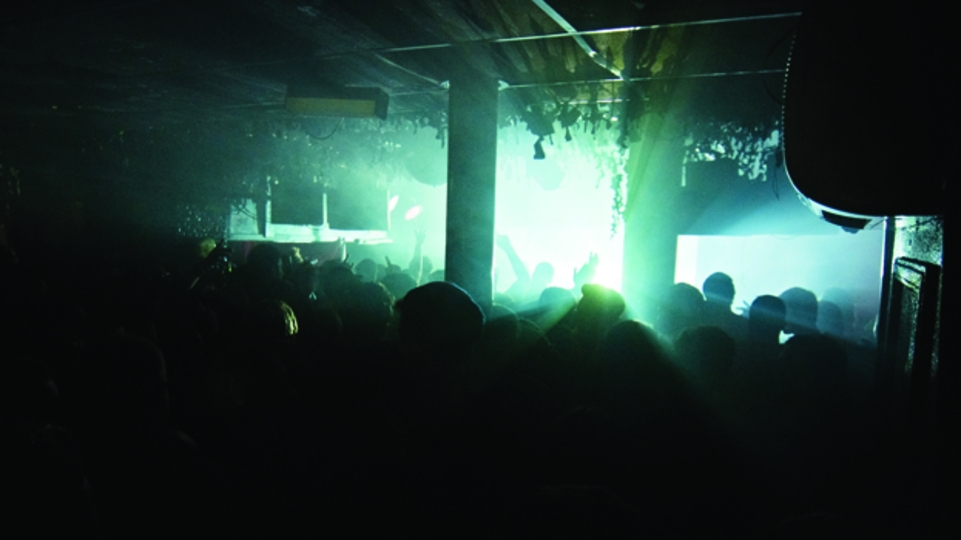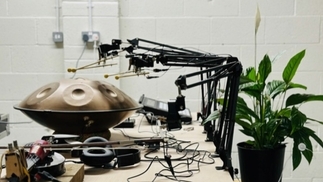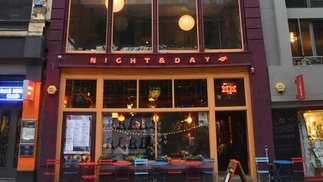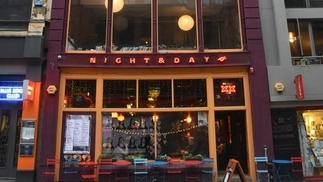MANCHESTER: WAREHOUSE CITY
There's a new techno sound echoing from the post-industrial streets of one of the UK's biggest conurbations. Influenced by Berlin and Detroit, Manchester's young producers are making something that could only be born in their city.

Our personal geography is one of the formative things about us. Our immediate surroundings and the people that surround us are our most important influencers. Throughout history they’ve directly inspired clusters of people and individuals within those clusters to do incredible things.
In electronic music terms we're talking about mythical periods like early Detroit, when Juan Atkins, Kevin Saunderson and Derrick May created the blueprint for techno music.
Their then-naïve experiments created a music that’s lasted way beyond anything they’d have ever expected, with the sound itself becoming a universally revered art-form that still continues to mutate and originate new strains. Think also about the global influence the German synthesiser group Kraftwerk had on a legion of impressionable minds. Then factor in the industrial surroundings that a specific group of Kraftwerks’s then-listenership had in their unforgiving Sheffield environment — a climate that produced landmark electronic bands like The Human League, Cabaret Voltaire and Heaven 17 — and you can start to directly trace how these young bands’ geography affected their new breed of synthesiser music (and how it did so in completely different ways).
The same influence processes are still happening today with the most recent and obvious comparison being the explosion of dubstep music in both London and Bristol. London (though more specifically, the borough of Croydon) was undoubtedly the kindling that lit the spark under that particular fire, but the way Bristol adopted and adapted the stark, spacious 140bpm template, pushing its remit further and harder into completely new directions was often in contrast to London, which seemed, for a while at least, to be whipping the testosterone up to fever pitch.
Obviously there were artists in both city camps who constantly shaped and re-shaped the boundaries for the music itself, but whilst London dubstep morphed more with drum & bass and grime, Bristol seemed to incorporate more and more elements of dub and reggae, house and techno with producers like Peverelist and Shackleton peppering their experimental, skeletal drum templates with the type of sub bass pulsations that were debuted at dubstep’s founding club night, FWD>>.
Whether it’s through a direct process of aural or social osmosis or not, there usually remains certain geographical footprints that are present in the music of likeminded artists. They’re not always so obvious and yeah, sometimes it does feel like a writer is completely clutching at straws when trying to proclaim that there’s a unity within a certain group of artists simply because of the cheap MIDI string sample pack that they’re using. But look at the short-lived funk dripping purple trinity of Bristol artists Joker, Guido and Gemmy, and the later furore Ramadanman and Addison Groove started with the 808 kits they used in tracks like ‘Glut’ and ‘Footcrab’ respectively. Quite conversely, sometimes a movement very much can be defined by something as simple as a synth or the producer’s choice of drum kit.

INDUSTRIAL ETHIC
Recently though, there’s been a bountiful bevy of precise, bass-heavy, techno-minded music emanating from one northern city in particular. With its slew of young and hungry artists sharing a certain micro-produced industrial ethic and making music that feels — and sounds — miles ahead of the pack, Manchester should very much be at the centre of a lot of people’s attention right now.
“Everyone knows each other really, really well here,” offers Liam Blackburn, aka Indigo, one of the minds behind the Manchester based Mindset and Electro Magnetic Fields labels and one half of the Houndstooth signed duo, Akkord. “But it’s more in kind of an indirect sense. It’s weird, because Manchester is a big city but it’s not. It’s tiny at the same time; it’s more like a town, with that type of really friendly atmosphere.
“Not many people are typically Mancunian as such,” he ponders. “Most of the people here have moved in from the suburbs or distant towns, so most of the scene in Manchester is made up of people who’ve moved in. There are no typically Mancunian people — even though we’d all consider ourselves that.”
Traditionally the cosmopolitan nature of a big city welcomes all nationalities and walks of life with open arms to contribute to the greater good of the place, with their assorted cultures feeding into the vibrant fabric of the city itself. And from speaking to Blackburn, a character who’s long been determined to help develop local talent and house their work on his record labels, for even a short while, it’s obvious that what really burns bright in the Greater Manchester area is a collective sense of pride.
“I couldn't speak for anyone else but we're not in thrall to anyone or anywhere up here,” offers Dan Hampson, one of the forward-thinking booking team at the Soup Kitchen, one of Manchester’s most revered no-frills club spaces.
“Mancunian producers are driven by the same confluence of sounds that have always influenced dance music — there's nothing new there — but no one here is actively looking to replicate another city or scene or sound.”
“There’s no real competition at all,” agrees Blackburn. “Everyone’s doing their own thing but it definitely has all got ‘a sound’. It’s a strange thing. It just seems a lot darker, a lot more real and a lot more true to itself.”
That Manchester sound definitely seems, to the people involved at least, to be pretty hard to pin down, with Conor Thomas, the in-house scribe for Boomkat — one of the most on-it online retailers in the world, and part of the crew behind the Faktion club night — agreeing.
“I couldn't really define a current Manchester sound. But there's always been a constant thread of dark, techy, aware and psychedelic dance music on the fringes and tucked in the crevices that's still being explored today quite unlike anywhere else.
“With regards to electronic music in particular,” Thomas continues, “I've witnessed equal amounts of change and stasis in the city. Unfortunately there's always gonna be the same old house and disco pedants in Manchester who'd like to keep it 'the way it was', but they're all gradually getting too old to go out any more...”

TRANSCENDING HERITAGE
Forever the spirited place and toting a music history that boasts a world famous and oft-commemorated (though long demolished) club in the Hacienda, alongside careers from bands like The Happy Mondays, Oasis and, of course, the outright success that is ‘Blue Monday,’ Manchester’s already got itself a shed load of heritage. But the current crop of producers — which features brand-new names like Acre, Werkha and Alan Johnson alongside people like AnD, Alex Coulton, the Ninja Tune-signed Illum Sphere and the R&S/Apollo signed Indigo and Synkro (plus a bunch of more established names like Marcus Intalex/Trevino, DRS, Chimpo and Dub Phizix operating more in drum & bass circles) — definitely seem more concerned with exploring the possibilities of what their music can do.
Rather than resting on the strength of local reputation, local Manchester club nights like Hoya:Hoya, Swing Ting, Faktion, Gesamtkunstwerk, meandyou. and Hit & Run are giving birth to something uniquely Mancunian; something that’s open, honest, that’s now being recognised by people outside of their city — a refreshing reward considering that these nights have made their name on their own terms and primarily for their own people in their own local area.
Hampson notes that the support network afforded to the crews — that’s been built and sustained by the relatively small size of the city — is a major factor in the city’s current position of strength. “Without sounding too saccharine, people are looking out for each other and trying to bring new talent through,” he states. “There's also just a lot of people in the city with good ideas, whether that’s musically or more from a promoter's perspective. There's a lot of talent based here and a lot of people who are proud to help things grow.”
“I'm lucky to have a constant stream of people offering me music to listen to,” furthers Thomas, whose role at Boomkat has helped a lot of Manchester music reach far beyond the confines of the city. “My role has put me in touch with stacks of fascinating people, some who've turned out to be good friends and many who constantly turn me on to great music.” People like Blackburn, who Thomas notes he first met at one of his Faktion parties back when they “were doing monthly shows with Monolake, Skull Disco, Modeselektor, Anthony Shakir, Kode9, Rhythm & Sound and others back in 2004-2006”.

AKKORD
Blackburn and his studio partner Joe McBride’s (aka Synkro) forthcoming self-titled album as Akkord could well be considered the epitome of this new murky ‘Manchester’ sound: one part industrial sound design and the other part functional (or you could read: brutal) club tool. Following three single releases — two of which they released themselves, selling out of the initial pressings via Boomkat and Hardwax — simply through word-of-mouth and the strength of the release, their 10-track debut LP treads a slightly grander and texturally mature path, with the duo upping the scale, size and tack of their productions for the occasion.
“We really needed to do Akkord, me and Joe,” Blackburn reveals, “because we got to the point as Indigo and Synkro that people were associating us together way too much. Even though the relationship is a given we felt like it suffocated us. Individually our sounds had gone down the Autonomic, 170bpm route and we just wanted to get away from the whole fucking dubstep, garage, whatever-you-want-to-call-it thing. Akkord was a really good outlet because we both still love the dark stuff. We wanted to branch out in that sense and develop the whole industrial side of the Akkord sound, which definitely comes from us living in the city.
But that same stark grounding in the combination of deep, gut-pulling basslines and dry percussion that’s evident on standout Akkord album tracks like ‘3dOS’ is also one of the most prominent things found in their contemporaries' collective conscious. Acre’s work on Visionist’s Lost Codes imprint, on his 'Forgotten EP', wielded the same sort of hard-edged greyscale bass work over its five tracks but Acre playfully reconfigured the impact, arranging it more for a grime audience by using the bass stabs as the driving force behind each bar. And Elsewhere & Stickman’s collaboration as Alan Johnson, which found a release a couple of months back on the Blank Mind label, tugged at the same sort of low level panic attack/restless emotion as Akkord does, with the 12”s B-side ‘Fickle’ segueing between periods of frenetic percussion and heavy raging bass stabs, seemingly at random.
“We've been writing music separately for a few years under our solo aliases,” comes the coordinated line from the Alan Johnson camp. “It's an opportunity for us to approach making music with a different mindset, allowing ideas to flow between the two of us. Sometimes it's easier to find inspiration when there aren't really any boundaries or preconceptions.”
And maybe it really is the boundaries that are imposed on scenes that are half the problem elsewhere. From speaking to just a handful of people involved in and around Manchester it’s the openness of the city and the potential it offers that’s one of the main reasons they enjoy living, working and creating there. The fact that a city with very little greenery (in the centre at least) has inspired such a glut of industrial leaning, lithe club music isn’t ever going to be the most newsworthy thing in the world. But the fact that the close knit and steely-yet-welcoming environment is yielding such vital and testing music should be celebrated. Manchester feels like a city that's so constantly overlooked in the wider geography of electronic music but it definitely feels like a sticking point that talented people within the city are doing their utmost to address.





